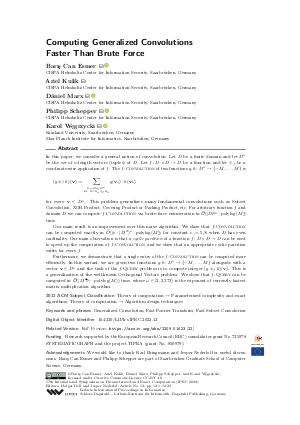LIPIcs.IPEC.2022.12.pdf
- Filesize: 1.34 MB
- 22 pages

 Creative Commons Attribution 4.0 International license
Creative Commons Attribution 4.0 International license

In this paper, we consider a general notion of convolution. Let D be a finite domain and let Dⁿ be the set of n-length vectors (tuples) of D. Let f : D × D → D be a function and let ⊕_f be a coordinate-wise application of f. The f-Convolution of two functions g,h : Dⁿ → {-M,…,M} is (g ⊛_f h)(v) := ∑_{v_g,v_h ∈ D^n s.t. v = v_g ⊕_f v_h} g(v_g) ⋅ h(v_h) for every 𝐯 ∈ Dⁿ. This problem generalizes many fundamental convolutions such as Subset Convolution, XOR Product, Covering Product or Packing Product, etc. For arbitrary function f and domain D we can compute f-Convolution via brute-force enumeration in 𝒪̃(|D|^{2n} ⋅ polylog(M)) time.
Our main result is an improvement over this naive algorithm. We show that f-Convolution can be computed exactly in 𝒪̃((c ⋅ |D|²)ⁿ ⋅ polylog(M)) for constant c := 5/6 when D has even cardinality. Our main observation is that a cyclic partition of a function f : D × D → D can be used to speed up the computation of f-Convolution, and we show that an appropriate cyclic partition exists for every f.
Furthermore, we demonstrate that a single entry of the f-Convolution can be computed more efficiently. In this variant, we are given two functions g,h : Dⁿ → {-M,…,M} alongside with a vector 𝐯 ∈ Dⁿ and the task of the f-Query problem is to compute integer (g ⊛_f h)(𝐯). This is a generalization of the well-known Orthogonal Vectors problem. We show that f-Query can be computed in 𝒪̃(|D|^{(ω/2)n} ⋅ polylog(M)) time, where ω ∈ [2,2.373) is the exponent of currently fastest matrix multiplication algorithm.











Feedback for Dagstuhl Publishing